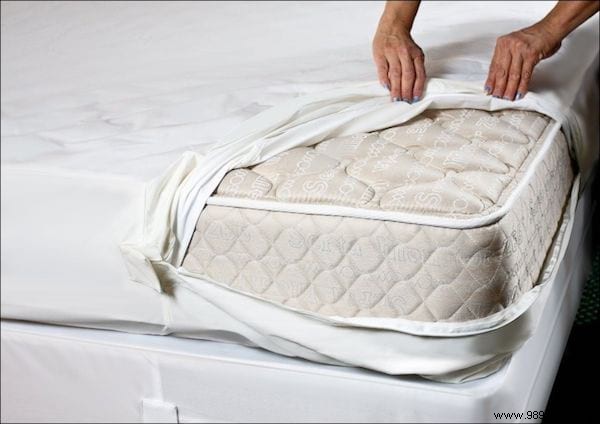
New Study Shows Bed Bugs Are Getting Tougher to kill.
This finding is all the more worrying given that over the past 15 years, there has been an upsurge in bedbugs.
People who fall victim to these critters often struggle to rid their homes of these tough pests, known to cause terribly itchy pimples.
Fortunately, there are effective treatments to eliminate them, without using pesticides.
Here is how to get rid of them or even better... prevent them from settling in your home . Watch:

Prevention and vigilance are essential to avoid a bed bug infestation.
It is much easier to control them if they are detected quickly, when there are only a few of them, rather than waiting until there are hundreds.
Here's how to find out if bedbugs have invaded your home and what to do to prevent them from getting in:

Bed bugs like to hide in cracks and crevices in walls, in luggage, boxes and clothing.
But since they feed on humans while they sleep, they are most often found in beds.
If you suspect an infestation, or if you live in a building where bedbugs are rampant, regularly inspect your bed sheets, mattress (including under the mattress), and seams for these insects.
You will recognize them:thumbtacks are flat and oval in shape. Their body is red or brown, about the size of an apple seed.
Look for adult insects, but also nymphs and eggs, as well as exoskeletons (shells that insects leave behind when they molt) and dark spots (droppings).

Bed bugs love to hide in mattresses. The easiest way is to prevent them from getting started.
To do this, enclose your mattress, your pillows and your box spring in a mattress protector to prevent bedbugs from reaching their favorite hiding place.

Hotel rooms are favorite places for bed bugs.
When you arrive, put your luggage in the bathroom, then inspect the bedding.
Check the locations shown in the image above to make sure nothing is left to chance.
Then store your suitcases on a luggage rack or on a hard surface.

If you have any doubts about the cleanliness of the hotels where you have slept, it is best to take a few precautions to avoid contaminating your home.
If possible, put your luggage and clothes in a large freezer for 4 days before bringing them into your house.
Indeed, extreme temperatures, hot or cold, kill bed bugs.
If this is not possible, put your luggage in a place where it cannot contaminate the rest of the house, such as the cellar.
You can also put your clothes in the dryer on a warm setting for 30 min.
And if you can, steam clean your luggage and clothes.

Have you noticed the presence of bed bugs in your home? Do not panic ! Here's how to get rid of them:
First, if you are a tenant, let your landlord know to prevent the spread to other apartments.
Then thoroughly vacuum all infested areas, including carpets and mattresses.
Empty the vacuum cleaner bag into a plastic bag, close it and throw it in the trash outside.
If you can't get bedbugs out of your bedding or some furniture, there's no other solution than to throw them away.
To prevent someone else from collecting infested furniture or mattresses, spray paint with the words "bed bugs" or put a sign over them.
Apply strong heat (over 40 degrees) to infested furniture or the rest of the apartment to kill bedbugs.
For this, the best is to use a steam cleaner like this one to disinfect carpets, rugs, curtains and even closets.
Consider running the steam cleaner through cracks and crevices to make sure bed bugs aren't hiding there.
Substances such as diatomaceous earth, boric acid and silica gel are very effective in killing bedbugs.
The particles that make up these products attach themselves to the body of bed bugs so that they dry up and die.
Put these powders in the cracks and crevices of your home, being careful not to ingest or inhale them and putting on protective gloves.
Not all bed bugs react the same way to insecticides.
So if you have an infestation that you can't control, call a professional who can help you determine which treatment or insecticide to use.
In any case, ask for a quote before signing to be sure not to pay the high price!

A study has shown that 2 insecticides commonly used to kill bed bugs are becoming less and less effective.
These are chlorfenapyr and bifenthrin. For this study, Dr. Gondhalekar and his team collected 10 groups of bedbugs.
They put them in glass vials and exposed them to each of the chemicals.
After several days, they evaluated the effectiveness of the chemicals in killing these insects.
Here are the results of their experiment:While most bed bugs were killed by the chemicals, 3 groups continued to thrive after being treated with chlorfenapyr.
And 5 groups continued to show signs of life after being treated with bifenthrin.
Which means that while some bedbugs still react to these chemicals, some are already immune.
And it is likely that over time more and more insects will become resistant.
This is further proof that controlling bed bugs with pesticides alone doesn't really work anymore.
The conclusion is that if you want to get rid of these bedbugs from the house, you can't just spray pesticides.